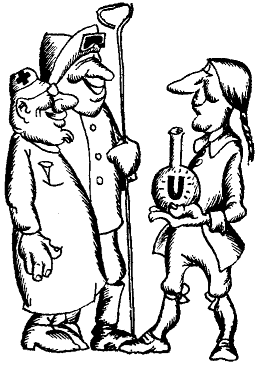107Stories About ChemistryINDEX |
36.
The Fate of One of
the Hundred and Four This is a little story about the fate of a chemical element. Its address is Flat No. 92 and its name is uranium. The name speaks for itself.  Two of the greatest scientific discoveries of all times and all peoples are connected with uranium. These are the discovery of radioactivity and the discovery of the fission of heavy nuclei by neutrons. Uranium gave people the key to the mastery of nuclear energy. Uranium helped them to produce elements unknown in nature: the transuranium elements, technetium and promethium. Historical documents witness that the biography of uranium began September 24, 1789. All kinds of things have happened in the history of the discovery of the chemical elements. In some cases nobody knows who the discoverer was. On the other hand there are elements that have a rather bulky list of �discoverers.� But uranium�s �godfather� has been established quite definitely. This was the Berlin chemist Martin Klaproth, one of the founders of analytical chemistry. However, history has played a prank on him: Martin Heinrich Klaproth proved to be only one of the �godfathers� of our hero. Pitchblende has been known to man for ages, and was considered an ore of zinc and iron. The sharp eye of the analyst Klaproth suspected an admixture of an unknown metal in it, and soon this suspicion became fact. The new element appeared as a black powder with a metallic lustre. It was named in honour of the planet Uranus, discovered not long before by the English astronomer Herschel. After that for half a century nobody doubted the truth of Klaproth�s discovery. Nobody even dared to question the work of Europe�s foremost analytical chemist. The element uranium marched through the pages of chemical textbooks. In 1843 this triumphant march was slowed down somewhat by the French chemist Eugene Peligot. He proved that what Klaproth had held in his hands was not the element uranium but only uranium oxide. Later unbiased historians wrote that Peligot could be considered the second �godfather� of the element. But, this did not exhaust the list of �godfathers� of uranium. The third was D. Mendeleyev. At first uranium just would not fit into the table. It was given a place in the third group between cadmium and tin, where indium is now situated. This place was allotted to uranium in accordance with its atomic weight, but not its properties. With respect to properties, uranium looked like a casual stranger in the box allotted to it. Mendeleyev concluded that the atomic weight of uranium had been determined incorrectly and he increased it by 50 per cent. This put uranium in Group VI of the table and made it the last in the series of elements. Such was the third birth of uranium. Soon experimenters showed that Mendeleyev was right. |





